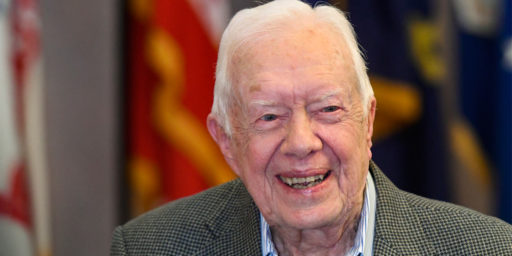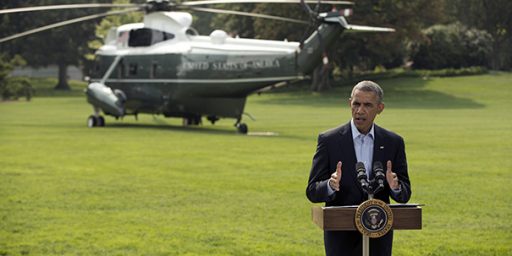Assessing Jimmy Carter
Oxblog’s David Adesnik takes David Brooks to task for writing,
Democratic foreign policy in the 1970’s was isolationist at worst, modest at best. Democrats eschewed flag-waving and moralistic language about the Soviets. Jimmy Carter talked about root causes like hunger and poverty. For many liberals, as Charles Krauthammer recently said, “cold warrior” was an epithet.
Says David,
This is revisionism at its worst. Jimmy Carter is the one who restored moralistic language to the American dialog with the Soviet Union. While Carter may have talked about hunger and poverty, he always talked about them in the context of human rights, a fundamentally American concept. As Carter memorably said, “Because we are free, we cannot be indifferent to the fate of freedom elsewhere.”
Moreover, one must recall that it was Nixon and Kissinger who purged moralistic language from the US-Soviet dialog in the process of pursuing an amoral realpolitik approach to all aspects of US foreign relations. Carter recognized the fundamental contradiction between this realpolitik and America’s democratic ideals and used it to his advantage. While Carter’s human rights policy may have lost its way on many occasions, there is no question that it restored idealism and morality to the American agenda.
Moralism, maybe. Morality, no. The problem with Carter’s foreign policy wasn’t his lofty ideals–indeed, they’re eerily similar to what the much-maligned neocons talk about nowadays–but with his unwillingness to actually do anything about them. When the Soviets invaded Afghanistan, Carter boycotted the Olympics and put on a grain embargo that hurt our farmers but not the Soviets, since we allowed everyone else to sell to the Soviets without consequence. When Iranian militants stormed our embassy in Tehran–sovereign American soil under international law–Carter did nothing for months and finally staged an inept rescue attempt. Our representatives were held hostage 444 days. He also pardoned the Vietnam draft dodgers, gave away the Panama Canal, and cut ties with long-time U.S. ally Taiwan to score points with Red China.
Kevin Drum observes:
Carter was the guy who abandoned the Nixon/Kissinger policy of realpolitik and genuinely hammered the Soviets on human rights — a policy picked up by Ronald Reagan and used to great effect in the 80s. Carter also approved major new weapons programs during his single term, brokered an important peace agreement in the Middle East, stuck by the Shah longer than even a conservative administration probably would have, and in 1979 approved the most wide ranging covert operation against the Soviets in the history of the CIA. If the Desert One rescue mission hadn’t failed, he might have been reelected in 1980.
This isn’t any kind of fiery defense of Carter, just a plea for a bit of balance. Unfortunately, the mere fact that he tries to broker peace agreements seems to be enough to send conservatives screaming for their thesauri. I suspect this tells us more about conservatives than it does about Carter.
Clearly, the Iran Hostage Crisis was a major part of his defeat. But the economy was in the tank, too. While I have long maintained that presidents get far too much credit and blame for the economy, the fact is Carter got elected, in part, for pointing out what he dubbed the “Misery Index“–the combination of inflation and unemployment–was at record highs under Gerald Ford. They were much worse four years later.
As recently as Monday, I gave Carter his due on the issue of rebuilding our military, an issue for which he has long been unfairly maligned. And I certainly agree that the Arab-Israeli accords were a remarkable achievement. Carter’s patriotism, decency, and integrity should never be questioned. But he was, by and large, a disaster as president, especially in foreign policy. As his NYT op-ed leading up to the war with Iraq demonstrates, he has a naive view of how the world works. I’m certainly glad he didn’t get a second term. And that the most Carter-like of the Democratic contenders, Howard Dean, isn’t going to be our next president.






Stagflation. Gas lines. Crashed helicopters. Malaise. Communist takeovers in third-world countries. Killer rabbits.
He was an awful President, top to bottom. The high point of his presidency was walking to his inaugeration, and it went all downhill from there. Reagan was the anti-Carter, as Dubya has been the anti-Clinton, and I thank God for them both.
I hate to get sucked into defending JC, who’s hardly my favorite president, but it’s grossly unfair to say that he reacted to Afghanistan by boycotting the Olympics. He also approved an unprecedentedly wide ranging CIA covert operation there, which grew every year for nearly a decade despite the fact that it wasn’t until about 1985 that Reagan took it seriously. (He was too busy fighting phantom Soviets in Nicaragua to spend any energy on real Soviets in Afghanistan.) Seriously, what more do you think he should have done? What did Reagan do?
As for Desert One, I haven’t read up on all the details, but is it really fair to blame that on him? I imagine he took the best advice possible from the military, which is all you can ask. And he did it in the face of a Secretary of State so dead set against it that he resigned beforehand over it. That’s hardly wimpy behavior. (Although, yes, perhaps he shouldn’t have waited six months to do it.)
I remember Carter in his little Jimmy sweater and his little Jimmy rocker telling us we were all going to freeze together.
but it’s grossly unfair to say that he reacted to Afghanistan by boycotting the Olympics.
Kevin will lie about anything.
I think, in context of his larger comment, Kevin is saying it’s unfair to say boycotting the Olympics is ALL he did. I don’t know about the intel operation he mentioned–I was 13 at the time and haven’t read anything about it since. I’ll have to check it out some time.
Kevin said:
As for Desert One, I haven’t read up on all the details, but is it really fair to blame that on him? I imagine he took the best advice possible from the military, which is all you can ask. And he did it in the face of a Secretary of State so dead set against it that he resigned beforehand over it. That’s hardly wimpy behavior.
I played a very small and insignificant role (from a great distance) in Desert One, so it has always interested me. Now maybe it’s just my conservative prejudices coloring my outlook, but I’ve always felt that Carter saw that the American hostages in Iran would obliterate any chance he had for reelection (and he was absolutely correct in that judgment), so he directed the military to develop a plan to extricate them. Once the plan was prepared and presented to him, he dithered away the time until it was really too late to implement it.
In other words, it’s my opinion that Desert One was a desperate, political move initiated by Carter (not the military) that he flubbed, resulting in the hostages’ continued incarceration and the deaths of several servicemen, not to mention the loss of matériel.
Slap that on top of his blanket pardon for the draft dodgers as his first official act as President, and it makes it easy for me to believe he damaged our country more than any other President, at least in my lifetime.
I was a voting adult in the Carter years (voted against him both times.)
I well recall the reports (never denied) that when in the White House meetings about the embassy capture, Carter kept wanting to know how many of the hostage-takers were conscripts, because he didn’t want to hurt those that were.